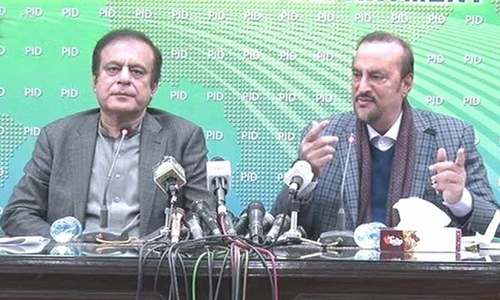ISLAMABAD: Prime Minister Imran Khan on Thursday expressed confidence that the ruling alliance would have majority in the Senate after the forthcoming elections of the upper house of parliament.
“We will have a sizeable majority in the Senate in the next election,” the prime minister said during a meeting with his spokespersons.
Adviser to the PM on Parliamentary Affairs Dr Babar Awan briefed the prime minister on the proposed legislation seeking holding of the Senate polls through open vote.
A participant of the meeting told Dawn that the prime minister was of the view that the government wanted to close the doors of horse-trading and corruption usually committed in the past during the Senate elections.
Says government wants to close doors on horse-trading, corruption committed in past during elections
He quoted clause 23 of the Charter of Democracy signed between the Pakistan Peoples Party (PPP) and Pakistan Muslim League-Nawaz (PML-N) in 2006 which also called for elimination of horse-trading and floor crossing. “They [the opposition] had agreed to end horse-trading, but now they are opposing the government move to ensure open ballot in the Senate polls,” the prime minister was quoted as saying.
Adviser to the PM on Accountability Shahzad Akbar gave briefing on land grabbing in Punjab by PML-M leaders and financiers. On this, the prime minister said it had been unveiled that opposition parties were getting monetary benefits from Qabza mafias (land grabbers) and in return the previous regimes had ignored illegal occupation of state land. “This had promoted a culture of corruption,” he added.
Spokesperson Shouzab Kanwal told Dawn that the prime minister insisted that all spokespersons and PTI leaders urge people to hate corruption and those committed it. “In fact society as a whole accepted or legalised corruption that destroyed our social fabric,” PM Khan was quoted as saying.
Ms Kanwal said the prime minister directed the spokespersons “not to lose dignity” while appearing in TV talk shows and always went there after through homework and study.
Earlier, addressing the launching ceremony of a docu-drama, “Pani ke Pankh”, the prime minister said Pakistanis shouldn’t be concerned about creating a “soft image” of their country only to win approval from the West, calling such a perception an “inferiority complex”.
“Nation should instead strive for being seen as an independent nation which has confidence in itself and does not have to rely on anyone for aid. I repeatedly hear we need to present a soft image of Pakistan. What does a soft image mean? Why do we say this, and if this soft image is established, will the world consider us very good?” he asked.
Citing the example of the vision of “enlightened moderation” introduced by former military ruler retired Gen Pervez Musharraf, he said people shouldn’t plan their actions based on what Western countries would approve. “We heard the term ‘enlightened moderation’ for the first time in our lives. Nobody knows what it means. Most people understood it that the more we resemble people in the West the more we will appear moderate. So people started speaking English and wearing Western clothes, and [thought] they had become moderate. Is this moderation? Please understand this is inferiority complex,” he added.
The prime minister reiterated that Pakistan had made a “mistake” by entering the US ‘war on terror’. “We entered someone else’s war which wasn’t ours; we should’ve never joined it,” he said, adding that Pakistan had first taken part in “glorifying jihad” in the 1980s and making Mujahideen “heroes”, and later pursued them as “terrorists” on the instructions of the US after 9/11. “So the country inevitably had to pay a heavy price for it.”
He said: “People shouldn’t think we need to present a soft image of ourselves because they [the West] started calling us ‘terrorists’. You can never enter someone else’s war, take benefits from them and not suffer for it,” he stressed.
Prime Minister Khan promised his government’s “complete support” for the film industry to produce original documentaries and films. He said there was a time when (PTV) dramas were watched across the border in India, adding that the once-thriving film industry had fallen behind because it “started copying cheap Indian films”.
The prime minister said the previous governments had executed short-term projects just to attract votes by cutting ribbons during their tenures which dragged the country behind. He said that due to the very reasons hydropower projects were not executed despite immense potential of 70,000 megawatts in the country, rather the governments signed exorbitant contracts to supply the costliest electricity in the subcontinent.
Mr Khan said that under the contracts, the government had to pay capacity payment even without consuming the electricity. Under this head, Rs180 billion was paid in 2019 and Rs500bn in 2020 by the incumbent government and the amount would swell to Rs1,500bn by 2023.
He said that after 50 years the government launched work on two major dams of Diamer-Bhasha and Mohmand to increase power production, conserve water and thus uplift the agriculture sector.
Concept writer of docu-drama Zonaira Azhar said the work would help in highlighting the positive image of the country, particularly Khyber Pakhtunkhwa province which was maligned as gun-oriented society during the anti-terror war.
On the occasion, a short clip of the docu-drama was also played which earned huge applause from the audience.
Earlier, Wapda chairman retired Lt Gen Muzammil Hussain said the authority was pursuing power projects based on three basic factors of prime minister’s people-centric policies — production of clean energy, uplift of agriculture sector and promotion of technology use. He told the audience that 3,000 engineers had been trained to carry out multiple projects in the power sector. He said power projects worth $26bn were under way.
Published in Dawn, January 29th, 2021

















































